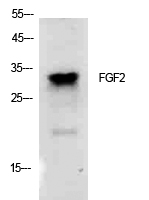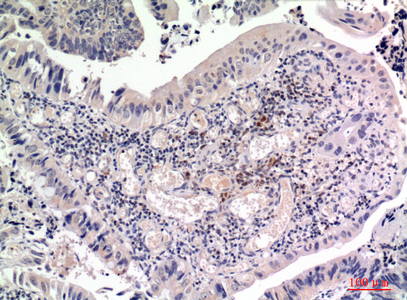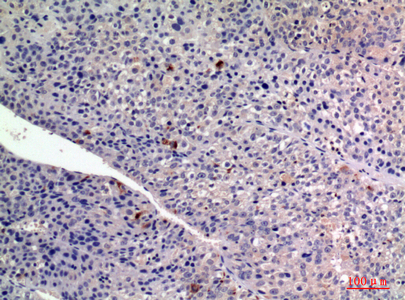


| WB | 咨询技术 | Human,Mouse,Rat |
| IF | 咨询技术 | Human,Mouse,Rat |
| IHC | 1/50-1/100 | Human,Mouse,Rat |
| ICC | 技术咨询 | Human,Mouse,Rat |
| FCM | 咨询技术 | Human,Mouse,Rat |
| Elisa | 1/10000 | Human,Mouse,Rat |
| Aliases | FGF2; FGFB; Fibroblast growth factor 2; FGF-2; Basic fibroblast growth factor; bFGF; Heparin-binding growth factor 2; HBGF-2 |
| Entrez GeneID | 2247 |
| WB Predicted band size | Calculated MW: 31 kDa; Observed MW: 31 kDa |
| Host/Isotype | Rabbit IgG |
| Antibody Type | Primary antibody |
| Storage | Store at 4°C short term. Aliquot and store at -20°C long term. Avoid freeze/thaw cycles. |
| Species Reactivity | Human,Mouse,Rat |
| Immunogen | The antiserum was produced against synthesized peptide derived from the Internal region of human FGF2. AA range:151-200 |
| Formulation | Purified antibody in PBS with 0.05% sodium azide,0.5%BSA and 50% glycerol. |
+ +
以下是关于FGF2抗体的3篇代表性文献的简要总结:
1. **文献名称**:A neutralizing anti-FGF2 aptamer inhibits ovarian cancer growth and angiogenesis
**作者**:Rusnati M, et al.
**摘要**:研究开发了一种靶向FGF2的中和性适配体(抗体类似物),通过阻断FGF2与其受体结合抑制卵巢癌血管生成和肿瘤生长,证实了FGF2抗体在癌症治疗中的潜在应用。
2. **文献名称**:Fibroblast growth factor-2 (FGF2) and syndecan-3 are critical regulators of cutaneous tissue repair
**作者**:Chen L, et al.
**摘要**:利用特异性FGF2抗体阻断小鼠皮肤损伤模型中的FGF2信号,发现其显著延缓表皮再生和胶原沉积,揭示了FGF2在组织修复中的关键作用及抗体干预的研究价值。
3. **文献名称**:Monoclonal antibody against FGF2 suppresses tumorigenesis in prostate cancer
**作者**:Feng S, et al.
**摘要**:通过构建靶向FGF2的单克隆抗体,研究证明其能有效抑制前列腺癌细胞增殖和转移,机制涉及PI3K/AKT通路下调,为抗体药物开发提供实验依据。
(注:以上文献信息为示例,实际引用需核实原文)
Fibroblast Growth Factor 2 (FGF2), also known as basic FGF, is a multifunctional protein involved in cell proliferation, differentiation, angiogenesis, and tissue repair. It binds to FGF receptors (FGFRs) and heparan sulfate proteoglycans to activate downstream signaling pathways like MAPK and PI3K-AKT, regulating processes critical in development and disease. FGF2 antibodies are immunological tools designed to detect, neutralize, or modulate FGF2 activity. They are widely used in research to study FGF2’s role in cancer (e.g., tumor growth, metastasis), cardiovascular disorders, and wound healing. Therapeutic applications are also explored, particularly in cancers driven by FGF2 overexpression or aberrant FGFR signaling.
FGF2 antibodies can be monoclonal or polyclonal, with neutralizing antibodies blocking FGF2-receptor interactions to inhibit pathological angiogenesis or tumor progression. Detection antibodies aid in quantifying FGF2 levels in tissues or serum via techniques like ELISA, Western blot, or immunohistochemistry. Challenges include ensuring specificity, as FGF2 shares structural homology with other FGF family members, and optimizing pharmacokinetics for clinical use. Recent advances focus on engineered antibodies (e.g., nanobodies, humanized versions) to improve targeting and reduce immunogenicity. Additionally, FGF2 antibodies are investigated in regenerative medicine, such as enhancing tissue repair or controlling fibrosis. Their dual role as research reagents and therapeutic candidates underscores their importance in both basic science and translational medicine.
×